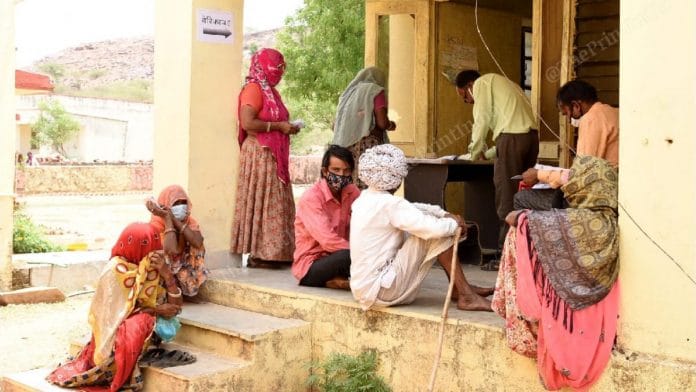Conservative attitude of Indian religious communities is one of the most significant findings of the recently released Pew survey on religion in India.
An India-specific conservatism, it seems, is clearly established. It not only defines the social outlook and cultural preferences of people, but also determines the everyday meanings of religion and religiosity. The crucial dividing line between spirituality and superstition is gradually blurring and religion is being understood purely in ritualistic terms.
This Indian version of conservatism has been discussed in relation to a few controversial issues such as inter-caste/inter-religious marriages, religious conversion, inter-religious friendship and communal neighbourhood. However, the emerging nature of religion and religiosity has not been given any particular attention in the recent public debates.
A systematic unpacking of contemporary meanings of religion is crucial because it can shed light on the dominant worldview of India’s religious communities and their perceptions of social and economic issues.
Also read: Pew India survey takes us back to one more thing Gandhi, Savarkar differed on
Three dominant features of contemporary religion
India is certainly a religious country. The survey shows that more than 97 per cent Indians assert that they believe in God and its diverse manifestations. This impressive finding, however, should not be overemphasised to celebrate the devoutness of Indian communities. The faith in God becomes meaningful only when it is placed in the larger context of religious values and practices.
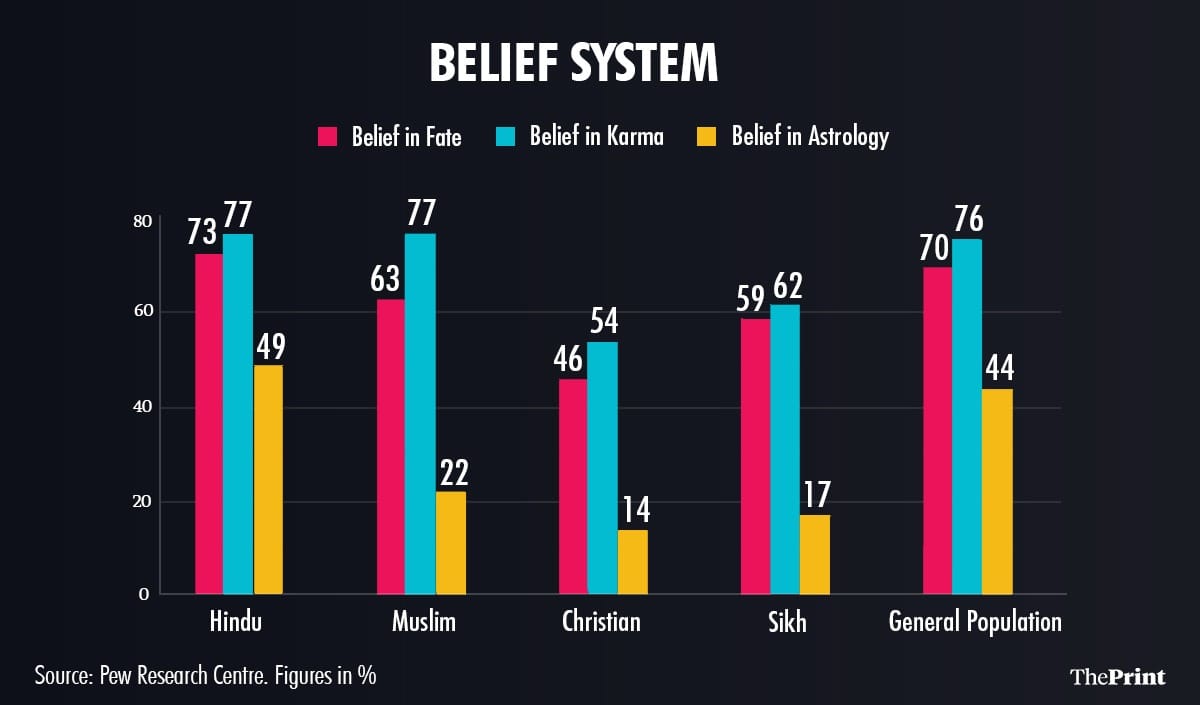
Fate and karma (deeds) are two such values that must be explored to make sense of the first fundamental feature of contemporary religiosity in India. Figure 1 shows that a significant majority (70 per cent) claims to believe in fate — the idea that the life events of an individual are largely predetermined. Hindus (73 per cent), Muslims (63 per cent) and Sikhs (59 per cent) strongly assert this view. This is also true about the belief in karma. An influential majority comprises Hindus (77 per cent), Muslims (77 per cent) and Jains (75 per cent) who claim that they have complete faith in the notion of karma.
The survey data cannot help us in extracting the exact meaning of the term karma here. Nevertheless, the prevailing understanding that ‘people will reap the benefits of their good deeds, and pay the price for their bad deeds, often in this life or in the next life’ seems to be the dominant meaning of karma in this regard.
This fate/karma centric religiosity is useful to understand the proliferation of an entirely new religious culture in India. There is an elusive search for divine men/women, babas, and fakirs in all religions. Confidence in astrology is also increasing. The survey tells us that around 44 per cent Indians believe in astrology.
The centrality of religious performances and rituals is the second feature of contemporary religion in India. The Pew survey asked about three crucial performative aspects and their religious significance: religious ceremonies for birth, celebration of marriage, and death rituals and processions. The vast majority of Indians claim that it is very important to have these ceremonies in cultural as well as religious sense (Figure 2).
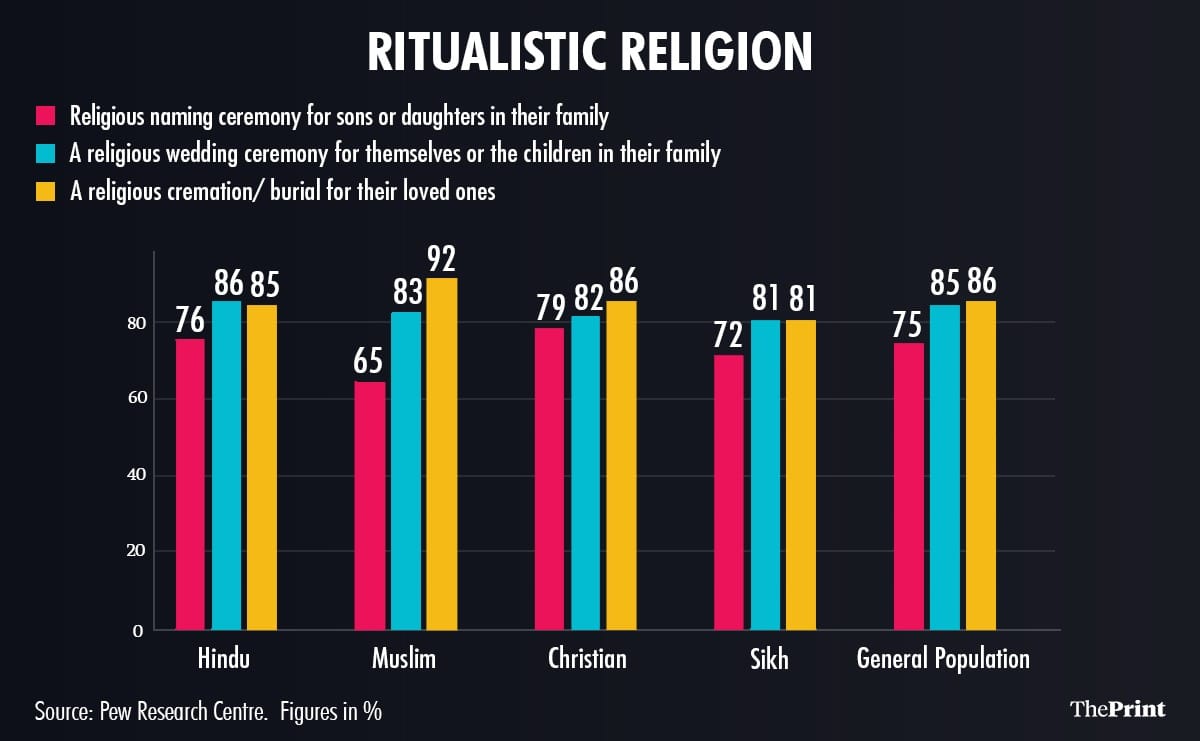
This brings us to the third dominant feature of contemporary religion. The ritualistic religiosity seems to transform every religious group into culturally restricted social entities. This is certainly true about Hindus and Muslims.
A clear majority of Hindus (72 per cent) feel that a person who eats beef cannot be a Hindu (Figure 3). This view is even higher than the percentage of Hindus who say a person cannot be Hindu if he/she does not believe in God (49 per cent), does not go to a temple (48 per cent) or does not perform prayers (48 per cent).
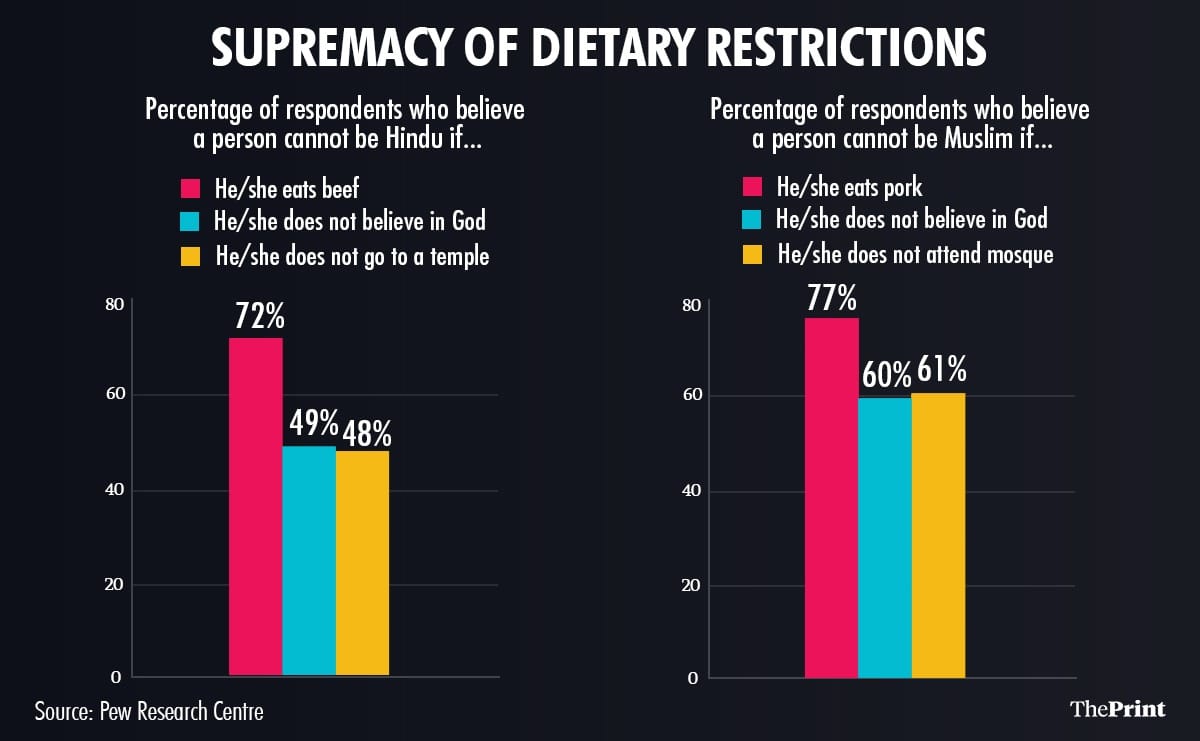
Muslims also give priority to dietary restrictions to offer a clear definition of Muslim identity. Almost three-quarters of Muslims (77 per cent) think that a person cannot be Muslim if he/she eats pork. Like Hindus, the belief in the existence of God (60 per cent) and/or attending mosque (61 per cent) are considered relatively less important aspects of Muslim identity.
Also read: Who is your neighbour? What we are not seeing in Pew study on India
Religion and the ‘real problems’
These three features of contemporary religion—centrality of fate and karma, overt ritualism, and supremacy of cultural practices—point towards an interesting configuration.
The factors such as fate/karma and astrology pave the way for a strange process of individuation. This belief system encourages an individual to think of his/her personal sufferings as an outcome of his/her previous actions. The impacts of larger social, economic and political processes on groups and communities are relegated to the margins and everything is explained in a highly personalised manner. This is exactly what the famous religious gurus teach people in today’s India.
The overt ritualism and supremacy of cultural practices, however, function differently. These features remind an individual that he/she belongs to a well-defined religious-cultural community. To assert his/her place in this communally marked social space, an individual has to follow the established values, practices, customs and rituals of his/her particular community.
This religious framework does not allow an individual to question internal boundaries of religion. In fact, there is no room for any discussion on the rational aspects of religious philosophies and moral principles. The conventional distinction between spirituality and dogma is replaced by a dogmatic conception of religion.
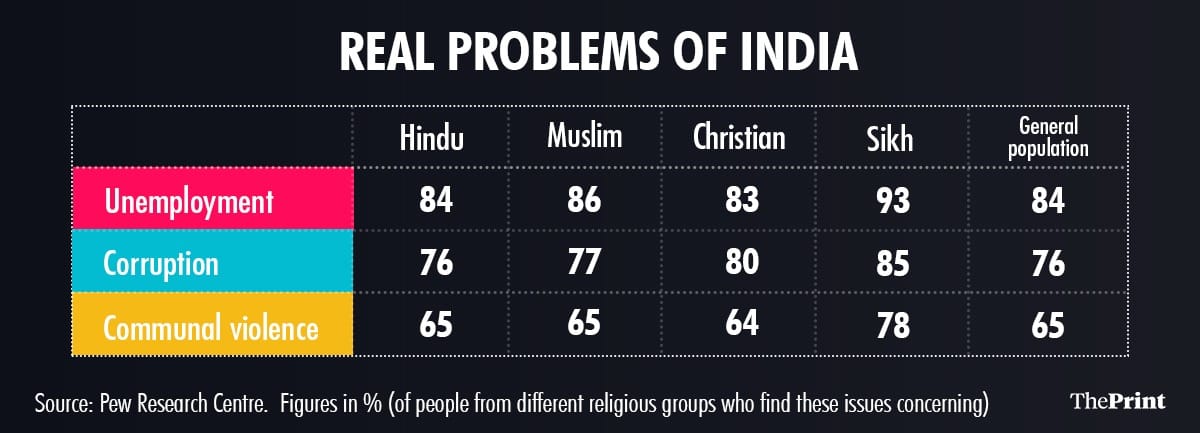
This explains why the crucial issues such as pandemic, unemployment, economic exploitation, corruption and the decline of political and legal institutions do not encourage Indian communities to assert themselves as active participants in the democratic life of the country.
Figure 4 shows that they do recognise the impacts of economic and political issues on their lives. But, their religiosity, which is guided by fate, karma, and ceremonial ritualism do not allow them to ask critical questions.
The Pew report reminds us that Indian society desperately needs a rational religion, something that Gandhi envisaged and practised.
(The Pew study is a comprehensive in-depth exploration of India’s contemporary religious life. The report is based on interview of 29,999 Indian adults (including 22,975 who identify as Hindu, 3,336 who identify as Muslim, 1,782 who identify as Sikh, 1,011 who identify as Christian, 719 who identify as Buddhist, 109 who identify as Jain and 67 who identify as belonging to another religion or as religiously unaffiliated). Interviews for this nationally representative survey were conducted face-to-face from November 2019, to March 23, 2020. The questionnaire was developed in English and translated into 16 languages, independently verified by professional linguists with native proficiency in regional dialects. For full report, click here)
This article is part of a series on the latest Pew Survey on religion in India. Read all articles here.
Hilal Ahmed is Associate Professor at CSDS. He was one of the expert advisors for this study. Views are personal.
(Edited by Anurag Chaubey)



